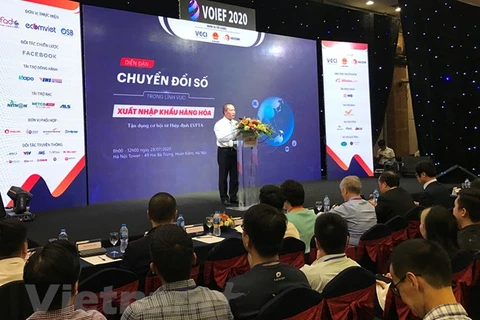HCM City (VNS/VNA) - Vietnam has seen a digital wave in the finance-banking industry, with many lenders investing significantly in digitisation, experts have said.
The COVID-19 pandemic might have had a severe effect on the economy, but it has helped accelerate banks’ digitisation, they told.
With many people looking for new options to deal with their financial affairs, digitisation of services and e-payments are becoming crucial, and banks, seizing the trend, have been embarking on the use of technology 4.0 and modernising their business models.
Digital technologies come with lower costs but offer wider coverage than traditional models.
The development of internet banking, mobile banking, payment solutions using QR codes, near-field communication technology (NFC), and advances in biometric technology using fingerprints and iris scanning has enabled banks to offer new and convenient products and services to customers, helping them achieve sustainable growth thanks to an increase in revenues from services and gradually reduction in dependence on lending.
The Joint Stock Commercial Bank for Foreign Trade Vietnam (Vietcombank) launched its new digital bank service, VCB Digibank, last month integrating its online trading platforms.
Dao Minh Tuan, the lender’s general director, said digital transformation has been identified as a key growth driver, and the bank is hastening the digital transformation process.
“We hope VCB Digibank will bring a new experience to and help millions of our customers enjoy convenience in every transaction with Vietcombank.”
The service has been developed based on a combination of internet and mobile banking platforms to provide a unified experience for customers.
The Vietnam Joint Stock Commercial Bank for Industry and Trade (VietinBank) and Housing Development Bank (HDBank) are also investing a lot of money into digitisation.
According to a survey last year by auditing firm PwC Vietnam, Vietnam was among the countries with the fastest rate of growth in mobile payments. The number of users had seen a sharp increase to 61 percent from just 37 percent the year before.
The country now has 70 credit institutions and payment intermediaries like e-wallets providing payment services online and through phone apps.
But there are still obstacles like the Vietnamese habit of using cash.
This is biggest barrier to digital banking development and there is a need to change people's mindsets, according to Pham Tien Dung, director of the State Bank of Vietnam’s payment department.
The central bank recently announced the electronic Know Your Customer, or eKYC, for opening accounts online.
Banks must improve the customer experience to make them satisfied with their products and services, Dung said./.
The COVID-19 pandemic might have had a severe effect on the economy, but it has helped accelerate banks’ digitisation, they told.
With many people looking for new options to deal with their financial affairs, digitisation of services and e-payments are becoming crucial, and banks, seizing the trend, have been embarking on the use of technology 4.0 and modernising their business models.
Digital technologies come with lower costs but offer wider coverage than traditional models.
The development of internet banking, mobile banking, payment solutions using QR codes, near-field communication technology (NFC), and advances in biometric technology using fingerprints and iris scanning has enabled banks to offer new and convenient products and services to customers, helping them achieve sustainable growth thanks to an increase in revenues from services and gradually reduction in dependence on lending.
The Joint Stock Commercial Bank for Foreign Trade Vietnam (Vietcombank) launched its new digital bank service, VCB Digibank, last month integrating its online trading platforms.
Dao Minh Tuan, the lender’s general director, said digital transformation has been identified as a key growth driver, and the bank is hastening the digital transformation process.
“We hope VCB Digibank will bring a new experience to and help millions of our customers enjoy convenience in every transaction with Vietcombank.”
The service has been developed based on a combination of internet and mobile banking platforms to provide a unified experience for customers.
The Vietnam Joint Stock Commercial Bank for Industry and Trade (VietinBank) and Housing Development Bank (HDBank) are also investing a lot of money into digitisation.
According to a survey last year by auditing firm PwC Vietnam, Vietnam was among the countries with the fastest rate of growth in mobile payments. The number of users had seen a sharp increase to 61 percent from just 37 percent the year before.
The country now has 70 credit institutions and payment intermediaries like e-wallets providing payment services online and through phone apps.
But there are still obstacles like the Vietnamese habit of using cash.
This is biggest barrier to digital banking development and there is a need to change people's mindsets, according to Pham Tien Dung, director of the State Bank of Vietnam’s payment department.
The central bank recently announced the electronic Know Your Customer, or eKYC, for opening accounts online.
Banks must improve the customer experience to make them satisfied with their products and services, Dung said./.
VNA
























